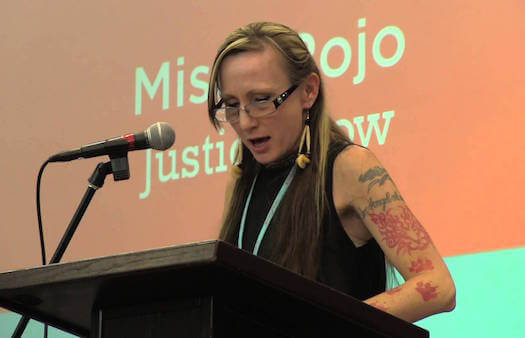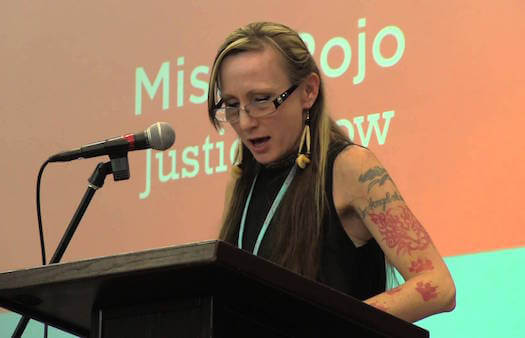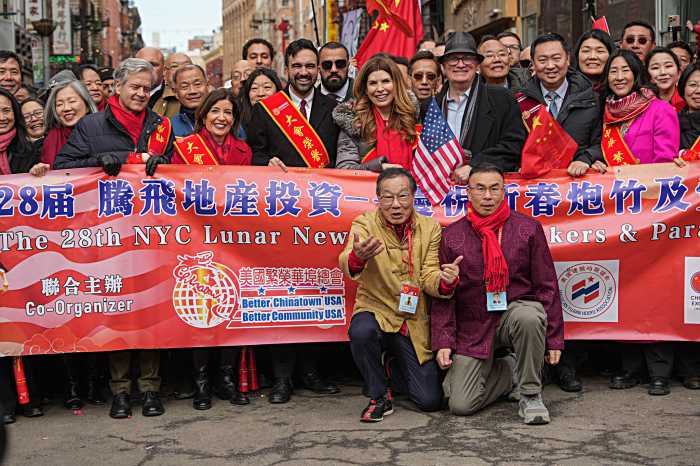Misty Rojo speaking on behalf of Justice Now at a criminal justice conference. | JUSTICE NOW
The United States, with only five percent of the world’s population, currently incarcerates some 2.3 million people, or more than 20 percent of the world’s prisoners. You’ve no doubt read statistics like these all too often. But from time to time, it’s good to remember that each of those people behind bars is, in fact, a human being.
This small account is about a California woman named Misty Rojo, whom I interviewed a few months ago.
At 14, Misty Rojo was one more kid on the street, battling drug addiction. Nine years later, she was behind bars, facing a life sentence for attempted murder.
It wasn’t that she hadn’t wanted to make her life work. While still in her teens, Misty tried a variety of jobs. She got married, had four sons, then contracted HIV from her husband, who began battering her. So she took the kids and went to women’s shelters.
“I kind of reached a point where I was breaking down,” said Misty, “and probably the drugs were not helping. I guess I kicked into survival mode in a very crazy way. There was somebody that lived near me that I knew was a drug dealer. I don’t know if he was really abusing his wife or not, but I thought he was. And so I felt that justified going in and robbing him and shooting him. It was connected to my abuse, but it wasn’t against my abuser.”
The hardest thing, when Misty entered the Central California Women’s Facility (CCWF) at 23, was to “wrap my mind around not having my children.” But the life inside didn’t surprise her. Many, probably most of the women there had also been abused. But lots of people have survived lots of different traumas, says Misty. “You just don’t get into people’s business that way if they don’t want to discuss it.”
During her first three months inside, she remembers, seven women died due to various medical conditions, many of which could have been treated if corrections officers had paid attention.
“People were just dropping dead,” she said. “The prison didn’t really explain much, they just told you to go lock yourself in your room until they removed the body.”
Basically, her life behind bars confirmed Misty’s sense that the world thought she was nothing.
Inside, people also discovered that Misty was HIV-positive.
“When it first came out, it was horrible,” she recalled. “My cellmates were like, ‘If your hair is left out, it’ll infect us.’ And, ‘How could you have children and not worry about killing them?’ It really tortured me.”
Then one day she met some members of a group called Justice Now, who rocked her world on a routine visit to CCWF. Justice Now, a California prisoner-support organization, works with women and transgender people for social justice and a world without prisons — ideas Misty had never heard before.
“What changed me,” said Misty, “was Justice Now giving me a lens to see how the layers of oppression work. To fight back and not just be a victim.”
At first, Misty explained, she got involved mostly to “piss off the prison.” Then she actually got to like taking classes on topics like substance abuse and the impact of crimes on victims. She learned to help people inside write appeals to the administration. And she learned about HIV from a peer-education group of HIV-positive people who helped her confront the shame and stigma she had been carrying around.
When the State of California predictably threatened to close down the Justice Now programs, Misty helped restructure the curriculum into something the state could accept. So began Justice Now’s Law Project, a teaching and advocacy program based on partnership with people inside who produce learning material that can work in any prison. Misty also became a member of Justice Now’s board.
The Law Project concentrates on health, family support, and compassionate release. Its educational texts, such as a comprehensive chapter on reproductive health, are collectively written by people both inside and outside prison. Just now, said Misty, they’re working on a chapter about eugenics, explaining to women how the State of California has historically used sterilization — for instance, how, between 2006 and 2010, California sterilized about 150 women prisoners, deemed by prison authorities to be likely to return to prison after release. There is also information on hepatitis C and HIV/AIDS, advice on how to navigate various prison systems, and advocacy for compassionate release.
“We’re one of the few organizations,” said Misty, “that helps people who are dying come home from prison.”
Misty Rojo was released in 2009 — but she still wants to abolish prisons. She’s now the communications and campaign director for Justice Now, and last year received her Bachelor of Science degree in Business Administration from the University of Phoenix. She calls this her “bullshit degree,” but admits it helps her to do social justice work.
“I’m proud of what I do,” Misty said. “I like that I get up and fight. That somebody inside is a little safer because we wrote a bill or made a phone call or provided them with a resource so they could navigate the system.”
Second to her major goal of no more prisons, Misty thinks about someday “being a name in a dusty textbook that talks about people who did this work a hundred years from now — when societies figured out that policing and prisons are horrible, tortuous systems.”
Susie Day is the author of “Snidelines: Talking Trash to Power,” published by Abingdon Square Publishing.


































